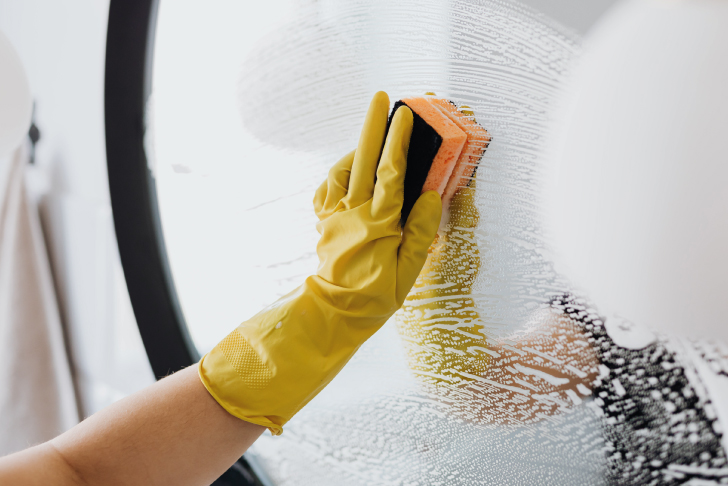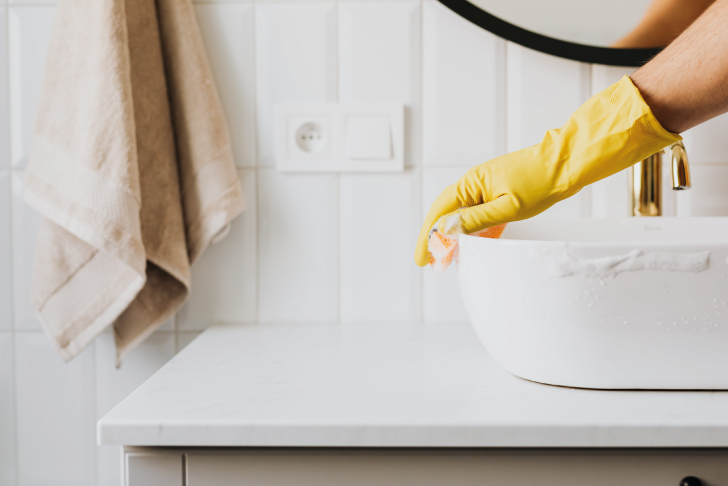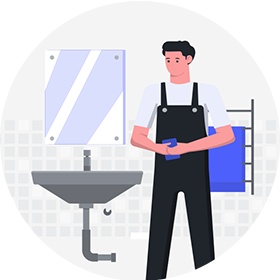Are You Ready to Start a Cleaning Business?
Australia’s cleaning industry has grown steadily over the last five years, averaging 1.2% of growth per year. While this may sound like a small amount, it’s still higher than the country’s overall economy.
Starting a cleaning business is also relatively easy and budget friendly. You could start a basic domestic cleaning business in less than a week. Plus, you may even have all the equipment you need already!
But if you want to build a thriving cleaning business in Australia, there are a few things you should know. In this guide, we cover everything involved in starting your own cleaning business and marketing it to find your first customers.
Is Starting Up a Cleaning Business a Profitable Idea?

Starting a cleaning business can certainly be profitable. Otherwise, there wouldn’t be over 38,000 registered cleaning businesses in Australia.
The commercial cleaning sector (which includes all types of cleaning businesses) is worth $14 billion and continues to grow at a steady rate. But there are some standout niches within the industry.
For example, revenue for Australian domestic cleaning businesses is expected to reach $590 million in 2022, continuing to grow at 4.27% per year.
But profitability isn’t the only reason for starting a cleaning business. Other reasons include:
- Cleaning doesn’t always require specialised skills. So, you offer simpler services in the beginning and add more difficult ones as you become comfortable.
- Opening a cleaning business can be cheap, lowering the risk and barriers to entry.
- The demand for outsourced cleaning continues to increase as more parents are working full-time.
- Cleaning businesses are flexible. You can stick to being a sole trader or grow your business by hiring employees depending on your preferences. You can also schedule as many or as few appointments as you like.
But no matter how you want to run your cleaning business, it still requires hard work, dedication, and the right entrepreneurial qualities — for example:
- A passion for helping others.
- The motivation and tenacity to continue during hard times.
- Persuasiveness and networking to help you close contracts and form business partnerships.
- Vision to help you set goals and predict where the cleaning industry is going.
- Humility to accept when you’re wrong so you can quickly pivot to another path.
How to Set Up Your Own Cleaning Business

The cost to start a cleaning business will vary depending on the services you offer and the equipment you need.
On the lower end, you can start your business for less than $1,000 if you already have a suitable vehicle. But if you need a vehicle and want to offer specialised services, like pressure washing, you’ll need to spend at least $25,000 - $50,000+ for a solo business.
And of course, these numbers will increase depending on the equipment brands you buy and whether you need equipment for multiple people.
Here’s a cleaning equipment list for starting a basic house cleaning business:
- Vehicle: $20,000 - $50,000 for a second-hand van.
- Broom and dustpan: $25 - $50
- Mop and bucket: $20 - $150
- Cloths and scrubbers: $20 - $30
- Various chemicals: $100 - $200
- Vacuum: $200 - $400+
Find out more: Need funding? Check out our guide on small business grants.
Understanding the Cleaning Industry

Before you start your business, it’s vital to understand the cleaning industry and where you fit within it. Without this knowledge, you’ll be operating blind which can cause easily avoidable mistakes, such as offering a service with poor demand.
Here’s what to consider:
- Domestic vs commercial cleaning: Domestic cleaning tends to be more flexible and easier to start while commercial cleaning requires more formality. Commercial cleaning also happens on a larger scale, meaning you’ll need specialised tools and likely a team as well.
- Choosing a specialty: Your chosen cleaning specialty should depend on local demand. If you’re unsure, you can always start with basic residential cleaning and then talk to customers about their preferences. You can also join cleaning forums and networking groups to learn more. Some potential specialties include eco-friendly cleaning, robotic cleaning, bond cleaning, pressure washing and sanitation.
Don’t get caught up in the research, though. Commit to starting your cleaning business by a certain date so you don’t procrastinate. If you make the wrong choices, you can always pivot later.
Creating a cleaning business plan
Like starting any company, you need a detailed business plan to refine your ideas, guide your actions and help you obtain funding (if you need it).
You should include information about your goals and how you’ll market your business. But sections of particular importance include:
- Market analysis: Here, you should share research about the industry and your speciality. For example, how many competitors are in your area, demand forecasts and industry trends.
- Finances: In this section, you’ll cover business funding and how you plan to manage your revenue. For example, you could save 10% of all revenue for equipment repairs and perishables to ensure you’re always ready for appointments.
- Services: Here, you’ll share details about your cleaning services—for example, what they are, how much you’ll charge, standard operating procedures and anything that makes your services unique.
Getting the right cleaning certifications
Starting a cleaning business doesn’t require extensive training. In fact, you just need the right equipment, insurance for a cleaning business and to register your business to start working.
But if you plan to offer specialised services, such as high-rise window cleaning, you’ll need additional certifications.
Here are some that you may need:
- You’ll need a Working at Heights certificate if you plan to offer outdoor cleaning above the ground floor.
- If you want formal training, you can consider a Cert III in Cleaning Operations.
- Plan to secure contracts with schools or nurseries? Then you’ll need a Blue Card for working around children.
Registering your cleaning business
Registering your cleaning business is free and relatively simple. You can even receive your business number the same day you apply.
All you need to do is head to the Business Registration Service and follow the instructions. But before you do, you must decide whether you’ll use a sole trader, partnership, or company structure.
Sole traders and partnerships require owners to be liable for their business’s debts and obligations while companies function as their own entities. If you’re unsure which suits you, it’s a good idea to consult with a tax or business agent.
Cleaning business Customer Relationship Management
Customer relationship management (CRM) is vital for growing a successful cleaning business since sustainability requires recurring appointments. You may be able to use a spreadsheet in the beginning, but you can easily miss details once you get busy.
That’s why we recommend using a CRM tool. Your chosen CRM should:
- Have a simple interface with intuitive navigation.
- Scale with your business. You don’t want to pay for features you don’t use or have to constantly switch software.
- Have the right tools to help your cleaning business—for example, appointment scheduling.
Some popular cleaning CRMs include Intuit Field Service Management, Jobber and ClickUp.
Legal obligations for your cleaning company
If you’re running your cleaning business solo, you don’t have to worry about much except having the necessary insurance, registering your business and paying your taxes on time.
However, if you want to scale your company by hiring team members, it gets a bit more complex.
Here are some of your obligations:
- You’ll need to pay employees fair wages based on Australia’s award system.
- Taking out workers’ compensation insurance.
- Using correct contracts and providing the necessary paperwork.
- Contributing the correct superannuation amounts.
- Providing a Fair Work Information Statement and statement of employment obligations.
How to Fund Your Australian Cleaning Business
Securing funding is often a major roadblock for aspiring entrepreneurs. But it’s not impossible with the right knowledge.
Most entrepreneurs turn to business loans from banks and private lenders as its the traditional funding option. You can learn more about this option in our guide on small business loans.
Another attractive option is business grants. These grants often have favourable terms and sometimes don’t require repayment. Check out our small business grants guide if this sounds good to you.
Some other less popular funding options that may be suitable for you include angel investors and peer-to-peer loans.
How to Market Your Cleaning Business

If you don’t market your cleaning business, it’ll be difficult to find customers. But that doesn’t mean you need to pay for an advertisement on prime-time TV.
Instead, the internet is one of the easiest, budget-friendly ways to get the word out about your business. For example, there are several forums and platforms where you can find customers and learn from other successful businesses.
Some forums and platforms to join include
- FB Australian Cleaners Forum.
- Local Expert.
- Local city or suburb forums.
Here, you can ask for advice or answer questions to show potential customers that you’re a competent cleaner. After you’ve engaged with leads a few times, you can send them a direct message to let them know about your services.
Once you get a few customers, it’s vital that you ask them if they’re comfortable giving you a reference or referring others to you. References and referrals act as social proof which increases trust and makes it easier for new customers to choose you as their cleaning company.
Before we finish this section, here are three tips for successful marketing:
- Don’t be afraid to go door-to-door: In the beginning, the fastest way to get the word out about your business is by interacting with potential customers. You can also take some printed flyers with you for people who aren’t home.
- Always, always, always ask for referrals: Referrals convert much better than leads from other sources since your business already has an acquaintance’s stamp of approval. It also means you can spend less on advertising.
- Keep testing marketing strategies: Always test new marketing strategies as you never know what will resonate with your target market. When one succeeds, double down on it while you continue experimenting.
Find out more: Need more advice on this sector? Read our sector-specific articles.
Starting a Cleaning Business Isn’t Your Only Option
Starting a cleaning business from the ground up is exciting, but there are many other ways to become an entrepreneur that may suit you better.
For example, you could invest in a cleaning franchise where you can leverage a proven business model and receive extra support from the head office. This option is great if you’re a first-time entrepreneur since you won’t have to do everything alone. If that sounds good, check out some of our cleaning franchise opportunities.
Alternatively, you can buy an existing cleaning business. While you won’t receive the same level of support as a franchise, you’ll have a plug-and-play business with contracts, customers, and equipment. It may even be profitable already!
If you want to jump into an operating cleaning business, you can check out our listings for domestic cleaning businesses and commercial cleaning companies for sale.
But if you’re not ready to sign the dotted line yet, you can learn more in our extensive guide on how to buy a business.
To recap, here’s a checklist for starting a cleaning business:
- Research and understand the cleaning industry as a whole and in your local area.
- Choose an in-demand speciality.
- Create your business plan.
- Get any necessary certifications.
- Figure out how you’ll fund your company.
- Register your cleaning business.
- Pick a CRM platform.
- Ensure you follow all legal obligations.
- Start marketing your company.
Starting or buying a cleaning company is an exciting but often daunting process. So, if you need help with anything—no matter how small—you can contact us at any time.
Good luck on your entrepreneurial journey!
